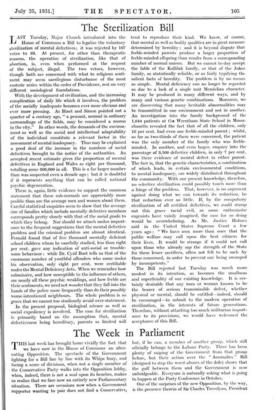The Sterilization Bill
LAST Tuesday, Major Church introduced into the House of Commons a Bill to legalize the voluntary sterilization of mental defectives ; it was rejected by 167 votes to 89. At present, for other th,an therapeutic reasons, the operation of sterilization, like that of abortion, is, even when performed at the request of the subject, illegal. The two vetoes, however, though both are concerned with what to religious senti- ment may seem sacrilegious disturbance of the most esoteric series within the order. of Providence, rest on very different sociological foundations.
With the development of civilization, and the increasing complication of daily life which it involves, the problem of the socially inadequate becomes ever more obvious and ever more pressing. As Binet and Simon pointed out a quarter of a century ago, " a peasant, normal in ordinary surroundings of the fields, may be considered a moron in the city." In other words, the demands of the environ- ment as well as the social and intellectual adaptability of the individual constitute a relevant factor in the assessment of mental inadequacy. Thus may be explained a good deal of the increase in the numbers of social defectives brought to the notice of the authorities. An accepted recent estimate gives the proportion of mental defectives in England and Wales as eight per thousand, totalling some 300,000 in all. This is a far larger number than was suspected even a decade ago ; but it is doubtful if. it represents anything that can be called national psychic degeneration.
There is, again, little evidence to support the common statement that these sub-normals are appreciably more prolific than are the average men and women about them. Careful statistical enquiries seem to show that the average size of families which include mentally defective members corresponds pretty closely with that of the social grade to which they belong. Nor should we attach undue import- ance to the frequent suggestions that the mental defective problem and the criminal problem are almost identical. Fernald found that of five thousand mentally deficient school children whom he carefully studied, less than eight per cent. gave any indication of anti-social or trouble- some behaviour ; while Dr. Cyril Burt tells us that of the enormous number of youthful offenders who came under his observation, only eight per cent. were certifiable under the Mental Deficiency Acts. When we remember how submissive, and how susceptible to the influence of others, are nearly all these psychic weaklings, and how feeble are their sentiments, we need not wonder that they fall into the hands of the police more frequently than do their possibly worse-intentioned neighbours. The whole problem is so grave that we cannot too studiously avoid over-statement.
In the present proposal, biological science as well as social expediency is involved. The case for sterilization is primarily based on the assumption that, mental defectiveness being hereditary, parents so limited will tend to reproduce their kind. We know, of course, that mental as well as bodily qualities are in great measure determined by heredity ; and it is beyond dispute that feeble-minded parents produce a larger proportion of feeble-minded offspring than results from a corresponding number of normal unions. But we cannot to-day accept the fable of the Kallilak family, or that of the Jukes family, as statistically reliable, or as fairly typifying the salient facts of heredity. The problem is by no means so simple. Mental deficiency can no longer be regarded as due to a lack of a single unit Mendelian character. It may be produced in many different ways, and by many and various genetic combinations. Moreover, we are discovering that many heritable abnormalities may be transmitted in one environment and not in another. An investigation into the family background of the 1,044 patients at the Wrentham State School in Massa- chusetts revealed the fact that of all the children, only 16 per cent. had even one feeble-minded parent ; whilst, so far as two-thirds of them were concerned, the patient was the only member of the family who was feeble- minded. In another, and even larger, enquiry into the parentage of 3,500 defective children, in only 7 per cent. was there evidence of mental defect in either parent. The fact is, that the genetic characteristics, a combination of which leads, in certain environmental conditions, to mental inadequacy, are widely distributed throughout the community. With our present knowledge, therefore, no selective sterilization could possibly touch more than a fringe of the problem. That, however, is no argument against doing what we can towards its reduction, be that reduction ever so little. If, by the compulsory sterilization of all certified defectives, we could stamp out this grave racial evil, as some enthusiastic eugenists have vainly imagined, the case for so doing would be overwhelming. As Mr. Justice Holmes said in the United States Supreme Court a few years ago : " We have seen more than once that the public welfare may call upon the best citizens for their lives. It would be strange if it could not call upon those who already sap the strength of the State for these lesser sacrifices, often not felt to be such by those concerned, in order to prevent our being swamped by incompetents."
The Bill rejected last Tuesday was much more modest in its intention, as becomes the smallness and superficiality of our existing knowledge. It is cer- tainly desirable that any man or woman known to be the bearer of serious transmissible defect, whether physical or mental, should be entitled—indeed, should be encouraged—to submit to the modern operation of sterilization, in the interests of future generations. Therefore, without attaching too much utilitarian import- ance to its provisions, we would have welcomed. the acceptance of this Bill.










































 Previous page
Previous page